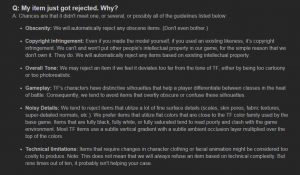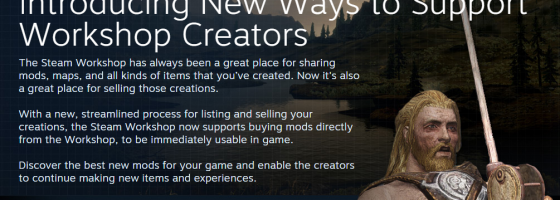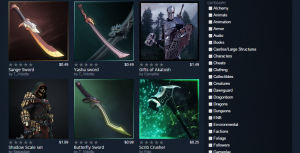The Steam Workshop has been instrumental in revitalizing and popularizing modding for the PC market and Steam. The ability to easily upload and integrate content for creators and subscribe and update mods for consumers has been amazing. Games like Skyrim, Cities: Skylines, Team Fortress and a lot more have made use of it.
But a recent change to the workshop has thrown all this into disarray and has creators and consumers both questioning Valve’s decision and the future of the modding community.
Polycount Pricing:
The Steam Workshop since its inception has operated under two main purposes. First for games with in game shops like DOTA 2, Counterstrike and Team Fortress, it has allowed modders to submit content to be approved and sold on the respective games under Valve’s consent and give the modder royalties on every item sold.
Second is the already mentioned consolidation of content for consumers. Someone can just subscribe to a mod and have it automatically downloaded, integrated and updated without any further input on their part. Both functions have made the act of modding very important for developers and consumers and have made the Steam Workshop immensely popular.
The change that Valve has implemented is that modders can now price their mods on the Steam Workshop along with putting them up there for free. The pricing and content are completely up to the modder; you could have 5 cent color palettes to $10 and up items and everything in between. There is also the option to set an item as “pay as you want” so that the person can decide how much they are willing to spend for it. For the consumer, they are given 24 hours from purchasing a mod to return it for a full refund; after that they are stuck with it.

Team Fortress has greatly benefited from the modding community and those that have made content for the game have been well rewarded
In terms of royalties or payment for each mod sold, the modder gets 25% of the proceeds while the rest go to Valve and the game company (which for right now is just Bethesda.)
Before we talk about my thoughts on this, I want to explain the rationale both from the modder and Valve’s point of view.
Creative Profits:
Mods just like games come in all varieties and levels of craftsmanship. There is a big difference between someone just changing the color of an in game item to someone making a completely new game experience or original content for a game (often times referred to as a full conversion mod.)
During the 00s, modding really started to become a popular form of expression; with games like Half Life, Unreal and more giving modders a canvas and tools to create content for the games they loved. However there was no way to get paid or even major recognition for the work that goes into the bigger mods. The dream was that your mod would become so popular that it would be an instant resume booster or even get you a job at the company that made the original game.
You can of course argue that these modders did this out of the love of the game and work which is a fair point. However, as someone who constantly puts out creative content, I definitely understand wanting to get paid for the time and effort you put into something which is why I have a Patreon campaign set up for Game-Wisdom. Especially if you are dedicating time that could go into a part or full time job. Most of the time, the majority of people who consume your content aren’t going to donate or contribute to the person on their own.
The Polycount pack from Team Fortress 2 was the first time that not only did a developer fully recognize and integrate a third party’s content into their game, but also rewarded them for their efforts. Having your content formally adopted by the game developer and allowed to profit from was huge and provided a goal for modders to reach for and a way to incentivize someone to work hard on original content.
More importantly, this was Valve creating a standard to judge the quality of the content coming in and raising it throughout the modder community.
Someone was not going to make it rich by just altering the color palette of a successful mod and calling it their own. You needed to make something original, that fit the game and that the rest of the player-base supported.
With that said, despite my thoughts on providing people ways to make money on their content, the idea of monetizing the Steam Workshop is a poor idea built on good intentions.
A Mad Market:
There are several critical problems with this change and we’ll start with quality control.
By allowing anyone to monetize their mods, there is no standard of quality in the same way that Valve has done with Team Fortress and this equates to a confusing market. Why should someone charge $4.99 for a new sword when someone else has a massive castle for $1.00?
Without a standard of pricing, it hurts the market as a whole and also begs the question: Why the hell should someone spend $5+ on a single mod when they can buy an entirely new game for around the same price? You can say that if someone enjoys the game they’re playing then more content is always welcomed, but what about the quality?
Right now Valve has a 24 hour refund policy on all mods but everyone knows that mods continue to get updated, new ones are introduced and updates to the game can impact the stability of the mod. What happens if a mod no longer works with the latest version of a game or the developer integrates said content for free and makes the mod useless? Speaking of new mods, this opens Pandora’s Box with the issue of mod ownership and payment.
Some of the bigger mods are actually made up of code and work done by multiple modders. In the past, modders shared code to bolster the community and allow the creation of truly awesome mods and conversions. But with the ability to charge for mods also comes the problem with deciding ownership. What’s stopping people from using someone else’s code and claiming it for themselves to make money off of their version of a mod or the case of someone trying to sell a mod that is made up of multiple modders’ code? The end result will be a fracturing of the modder community which will lead to less quality mods down the line.

Valve has strict guidelines for what mods they will look into adopting into Team Fortress to be sold, something not happening on the Skyrim workshop
Another issue with implementing payment is how this applies to copyrighted mods and what this means for the developers. There have already been reports of mods being taken down due to copyright issues.
This wasn’t a problem when no money was being exchanged but this system opens the door for copyright holders demanding royalties and modders and developers having litigation taken against them.
Then there is the issue from a developer standpoint and keeping their game balanced. What’s to stop someone from releasing a mod that breaks the game or alters in game content beyond the developer’s intent? Without a standard of quality and vetting, this leaves the system pretty much out of control. Now I know that defenders of this are going to comment that the system is optional but that doesn’t absolve it of any problems. By splitting up mods between being paid or free, this will fractured the modding community and again will affect the partnerships that have been created.
Ultimately this is a good idea in theory, but the practical application that Valve has set doesn’t work and I have some thoughts on this.
Money, Money, Money:
Money is a powerful thing and one of the biggest challenges that any content creator faces is figuring out a way to get paid for their work. There is a major difference in someone locking content behind pay walls vs. having a donation option set up for people to give you money. The former is looked at as a demand on the consumer while the latter is the consumer’s choice.
I already talked about further up the problems with donations and the fact that most people will not donate, regardless of the quality or quantity of content. With Game-Wisdom, I could very easily set up subscription content that can only be viewed by people who pay to my Patreon just like how modders are able to lock their content behind pay walls.

The Debut pack represents the modders Valve wanted to promote as the first to sign on for the service, but it’s not exactly being reviewed positively at the moment
The problem however is the impact this has on the consumer and their judgment of the content.
The second you charge someone to view or use your content, they will look at the value a lot closer and scrutinize it.
If they find that the value is not there, they will cut ties with you both financially and as a fan. Again, there is a big difference in getting money through someone donating vs. someone being forced.
And that takes me to my final point for this piece: How would I fix this?
Workshop Management:
There are two major areas of concern that this issue boils down for me: How do we reward content creators and protect the consumer at the same time? In order for this system to work, both parties have to be looked after and protected.
Let’s start with the creators as it’s their content that is being bought and sold. The first thing I would do is institute a vetting process much like the original format of the workshop. Someone can’t just go onto Steam one day, start a level 0 account and begin selling $5 mods; you have to earn that privilege.
Just like with Team Fortress, modders can put up their content on the workshop for free and have it critiqued and judged by the community. Just like with the other games, the cream will rise to the top and there will be modders whose contribution and quality will make them shine on the workshop.

While modders can ask for donations for contributing to Cities Skylines, the developers have made it clear that they will not tolerate mods being sold
The people who do rise up will unlock the option to sell mods and should receive a higher cut of the proceeds in my opinion; at least 50% if they become a trusted name in the community.
These modders can still put out free content of course and the incentive to earn money should challenge them to step up their game and produce greater content.
This incentive is also the reason why modders should receive a bigger share as it’s their time and money being put into creating more content for these games to make them better. If you look at Patreon itself, people receive 90% of whatever is donated compared to the 25% split. On the critique that someone is only working on something that has already been made, there is still time and energy being put in to make original content and if you want people to focus on quality, then they deserve a quality reward.
Regarding joint work, modders can work together to produce a single paid mod, but they will have to handle the negotiating of terms themselves. One last detail, only mods that add content to a game can be put for purchased — Something like DS Fix for Dark Souls wouldn’t count as the changes are under the hood but something like Stalker Complete that was an entire graphical and gameplay improvement could.
Now for the consumer; obviously a vetting process will protect the consumer base from people trying to scam them and other modders but there needs to be more in place. For my idea, any paid mods have to come with the guarantee of future proofing IE: The modder must continue to update said mod to keep pace with the current version of the game. Also, paid mods cannot rely on other modded files which could lead to conflicts. Any breech of this by the modder will require them to refund their earnings along with Steam and the developer back to the people who purchased the mod.
With these points, the variety of paid mods will obviously shrink as there are limitations on both the modder and their content, but that’s the point. If you want to get paid for your content, then you need to prove that you are about original quality content and for the people who do that, they will be rewarded.
A Free Market:
Monetizing mods is a great idea but Valve is trying to create a system that is self-policing and hoping to sit back and have the money come in at the expense of the community. Everyone wants to get paid for their time and work and there is nothing wrong with that, but you need quality control and proper procedures in place to protect everyone involved — The modders and the consumers.
My gut is telling me that this isn’t going to go away but Valve will be altering it and changing some of the wording very shortly as they’ve done with Greenlight and Early Access. We are at the point where content creators have the tools and the options to make amazing content and get rewarded for it, but we need a fleshed out system that is fair for the developers, Steam, the modders and of course the consumer for it to work.
Update: With the recent announcement that Valve has taken down the mod monetization for now, hopefully they will look at more protection for users and greater compensation and vetting for content creators when the system will arguably be put back up.


